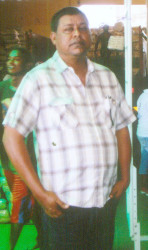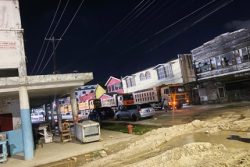Every year, for the past 11 years, the Berbice rice giants Nand Persaud and Company put in an appearance at the Berbice Expo. Mohindra Persaud, the General Manager of what is almost certainly Berbice’s most diversified private sector entity has come to feel a sense of commitment to the Berbice Expo. There may have been times when the company might have contemplated skipping the event, but Persaud says the pressure of what is perhaps best described as public expectation, takes them there.
This year the company’s booth at the event, one of the largest, boasted the customary items: various varieties of rice, tractors, tyres, fertilizer and spare parts. However, the company’s most conspicuous exhibit was a video display advertising ‘aerial spraying,’ a collaborative initiative with Air Services Ltd, one of the country’s largest aviation service providers, to treat rice fields from the air. Up until now, the treatment of rice fields has been done manually, deploying men with spray cans to apply the chemicals. It costs around $4,500 per day to apply the chemicals manually and some farmers have told Stabroek Business that not all of the field hands can be relied on to do the job thoroughly.
Two months ago Nand Persaud and Company commenced the service. The cost of applying pesticide is $665 per acre. Application of fertilizer costs $2,660 per acre. Rice farmers have told Stabroek Business that it is a cheaper, more efficient operation.

There are ground rules that take account of environmental and logistical considerations. Rice fields to be sprayed must be situated at least 2,500 feet from cash crop farms and homesteads. After the area to be treated has been marked by the farmer with white flags the aircraft move in and administer the treatment.
Mohindra Persaud concedes that the service will create a measure of labour displacement but says that those job losses can almost certainly be made up for by other openings in the rice sector.
As far as his own company is concerned Persaud says that attracting and keeping skilled staff is the much bigger challenge. Maintenance in the company’s electrical and mechanical departments demands qualified personnel and according to the company official the quality of training being provided by the Ministry of Education-run Upper Corentyne training Centre and the New Amsterdam Technical Institute is inadequate to meet the company’s needs. It is, Persaud says, usually a matter of the graduates of these institutions matching the accomplishments reflected on their diplomas and certificates with the practical requirements of the workshop. The company, he says, often finds itself involved in its own re-training programme. There is, too, the challenge of often having to cope with a work ethic that is inconsistent with the demands of a profit-driven business entity. Scarce skills is also placing limits on the company’s ability to expand beyond its present twenty departments. In some instances where employees have been promoted to managerial level they themselves have eventually asked to be removed from that level of responsibility.
Rice farming is part of the Nand Persaud enterprise and Persaud says the current circumstances in the local rice industry are worrying. He is worried that in recent months, prices on the global market have been slipping steadily.
The company markets its own rice abroad and Persaud told Stabroek Business that his company has taken a decision to pull out of the Jamaica market which has become saturated with other rice product from Guyana and Suriname.
Accordingly, and despite the global competition Nand Persaud and Company has turned its attention to the European market. Persaud understands that the company must be prepared to undertake “aggressive marketing” if it is to win a viable share of what is already a competitive market. Elsewhere in the Caribbean, Nand Persaud and Company still remains a strong seller.
Persaud says that apart from serving as a market for the farmers’ paddy, Nand Persaud and Company also provides credit to farmers for fertilizers, spare parts and chemicals and other rice-related services. Recently, the company recruited an Agriculture Science graduate from the University of Guyana’s Tain Campus to offer advice to farmers.
Persaud says that setting aside the price crisis in the rice industry there are also serious technical concerns associated with competence in crop management. Regrettably, he says, Berbice rice farmers lack any real confidence in the Extension Officers assigned to address their problems. He talks about a serious “competence problem” with the Extension Officers.
There is, Persaud says, a considerable knock-on to the performance of the industry. He estimates that the competence deficit could be costing the sector could be costing the sector up to 10 bags of paddy per acre.
Getting water into the rice fields (a problem which this newspaper reported on from the Black Bush Polder a few weeks ago) is commonplace in Berbice. In the rice-growing areas water must be pumped to the fields for between 80 to 100 days. The problem is that the pumping of water is the state’s responsibility and it often does so inefficiently. Persaud says that it is not uncommon for reports of malfunctioning pumps to surface just when the farmers are preparing to flood their rice fields. He talks about “a lack of proper preparation.” There are also problems associated with the efficient movement of water in and out of the fields.
One of Persaud’s current preoccupations is with preparing to treat with the farmers currently reaping the second crop. For this crop the company will be upping it paddy purchase from one million bags last year to one million, two hundred bags this year. Every year, he says, the company tries to “do better” by the farmers.
Renovation work on disused rice mill in Black Bush Polder acquired two years ago by the company is now completed and Persaud says that its proximity to the rice fields in the area saves the farmers the cost of transporting their paddy to alternative mills. Milling of the current crop of paddy will mark the fifth time that the mill is being used.
The company has its issues with the management of the Berbice River Bridge. Persaud explains despite its best efforts the company has been unable to secure agreement for rice containers to cross the bridge. Accordingly, the movement of rice to ports in Georgetown takes place at greater cost.
Persaud says, however, that the 40-year-old company is in the rice industry for the long haul. He believes that his family has seen enough of the resilience of the sector to be persuaded that it will bounce back from its present travails.








